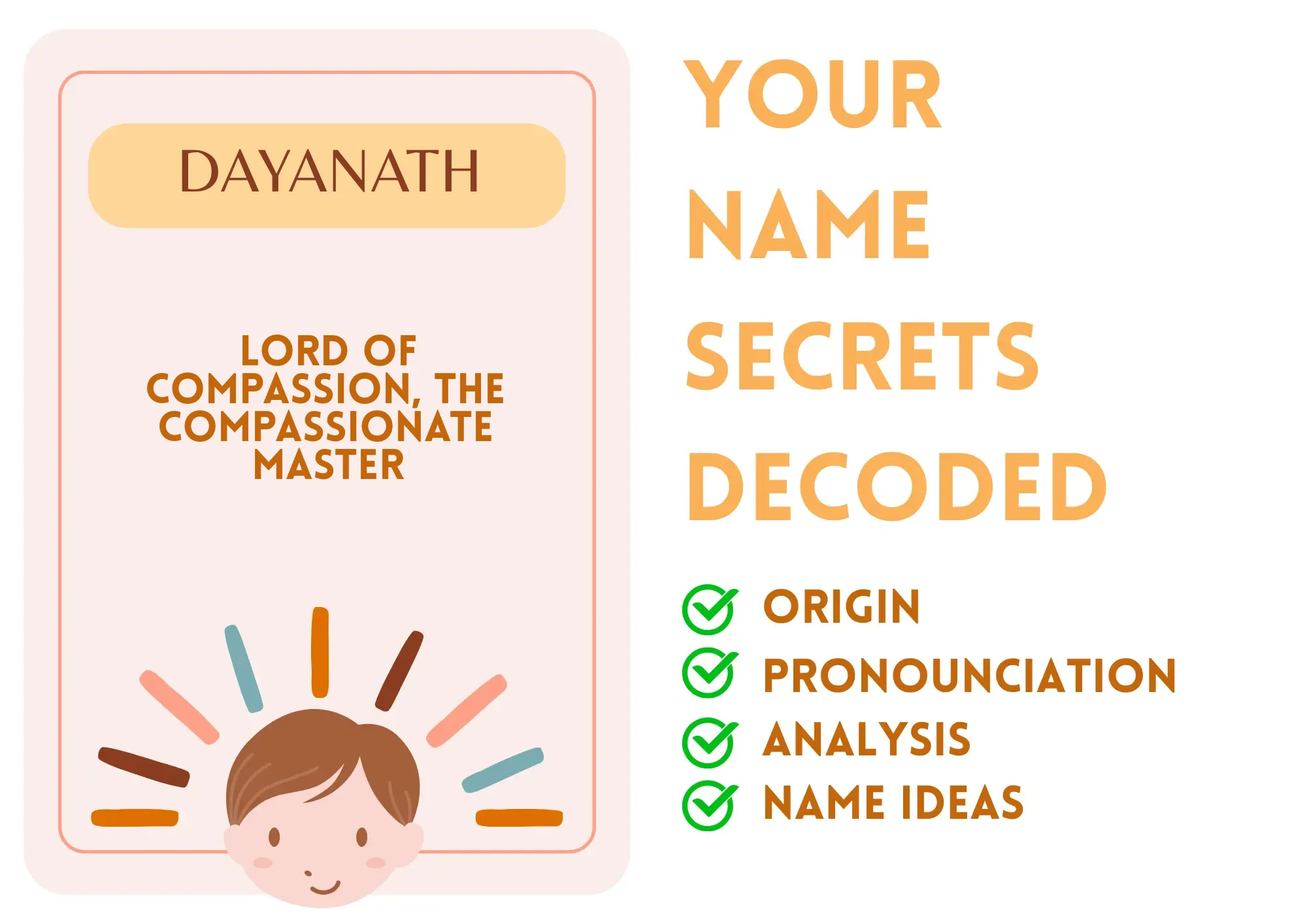
Dayanath
Dayanath is a deeply meaningful name of Sanskrit origin, translating to 'Lord of compassion' or 'the compassionate master'. Commonly used in India, it is traditionally a masculine name and embodies a sense of kindness and empathy, qualities highly valued in Hindu culture. Dayanath is particularly revered in religious contexts, aligning with the principles of Dharma and compassion found in various Hindu scriptures.
The name carries positive connotations, reflecting attributes such as kindness, empathy, and moral strength. It is straightforward to write and pronounce, with common nicknames that provide a sense of warmth and familiarity.
Dayanath appears in various cultural narratives emphasizing compassion and moral leadership, making it a name that resonates deeply with parents seeking meaningful attributes for their children.
Basic Information
Gender: Boy
Sounds Like: dah-yah-nahth
Pronunciation Explanation: The name is divided into three syllables: 'daya' (dah-yah) with the emphasis on 'daya', and 'nath' (nahth) pronounced with a soft 'n'.
Summary and Meaning
Meaning: Lord of compassion, the compassionate master
Origin: The name Dayanath has Indian origins, rooted in the Sanskrit language and Hindu culture.
Usage: Dayanath is traditionally a masculine name, reflecting attributes that are conventionally esteemed in boys, such as leadership and compassion.
Name Number (Chaldean)
Name Number (Pythagorean)
Name Constellation (Nakshatra)
Name Zodiac Sign (Rashi)
Popularity (Global Rank)
Overall: 186531
Boys: 72681
Most Popular in
Religious and Cultural Significance
Religion: Hindu
Background: In Hinduism, Dayanath signifies a respected figure embodying compassion and moral righteousness, resonating with the teachings of various deities associated with kindness.
Cultural Significance: The name is popular due to its significant meaning, often chosen for boys with the hope they will embody compassion and moral strength throughout their lives.
Historical Significance: Dayanath has historical importance in Hindu philosophical texts and teachings, illustrating the virtues of compassion and moral duty towards others.
Popular Culture
Literature and Mythology: The name Dayanath may appear in various literary contexts, often symbolizing characters who exhibit great kindness and moral integrity.
Movies and Television: Characters named Dayanath can sometimes be found in Indian dramas, where they typically represent moral fortitude and compassion in challenging situations.
Feelings and Perceptions
Perception: Dayanath is mostly perceived positively, evoking feelings of warmth, empathy, and moral strength. It is appreciated for its deep cultural significance and connection to compassionate ideals.
Positive Feelings: Compassionate, noble, strong, kind, revered, wise.
Negative Feelings: May seem less familiar or pronounced differently by non-native speakers.
Practical Considerations
Ease of Writing and Calling: The name Dayanath is moderately easy to write and pronounce, consisting of three syllables. It requires care in pronunciation to fully capture its essence.
Common Typos and Misspellings: Dayanathh,Dainath,Dayanathth,Dajanath
Common Nicknames: Daya,Nath,Danny,Nathi
Dayanath Popularity
Dayanath Usage and Popularity By Country
| Country | Rank (Overall) |
|---|---|
| Sri Lanka | 5894 |
| Nepal | 13473 |
| India | 55432 |
| Malaysia | 93908 |
| Australia | 105589 |
| Canada | 149654 |
| France | 158953 |
| United Kingdom | 182431 |
| United States | 344452 |
Dayanath Usage and Popularity By City
| City | Rank (Overall) |
|---|---|
| Darbhanga | 788 |
Compatibility Analysis
Famous Persons Named Dayanath
No results found for Dayanath.
Related Names
Similar Sounding Names:
Dayan,Dayal,Dharanath,Daman